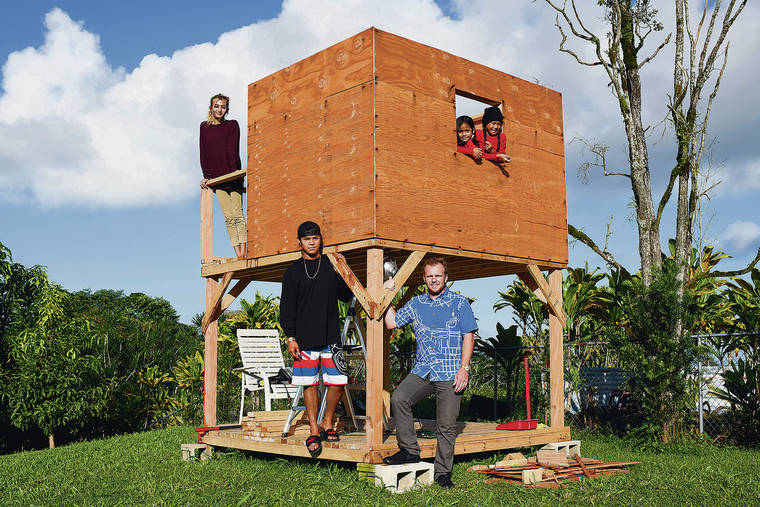Heroes Next Door: Onetime foster kid dedicates his life to parenting and improving the system

COURTESY GEN YAMAGUCHI
Joe O’Connell gathered with the children he has fostered at the work-in-progress treehouse in their backyard in Hilo. The house is being built by one of the children, Shandon Cuba, 20. Mazikeen Cullen 16, left, Cuba, 20, O’Connell, Shaniyah Alvarez, 6, and Saydee Kaneao, 9, posed together. Missing is Kia Campbell, 17.
Joe O’Connell grew up in Waimea as a foster child, a ward of a notoriously overwhelmed child welfare system that often produces angry, bitter and struggling adults.
Not only did O’Connell refuse to let that happen but he has devoted his life to improving the system. He became a foster parent at age 25, taking in some of the most troubled and unwanted kids, and he would eventually lead a campaign to improve the system on the Big Island.
Now 30, the foster parent with seven kids in his Hilo home also works in the child welfare business as East Hawaii supervisor for Parents Inc., a service contractor for the state Child Welfare Services.
At 8 years old, O’Connell and his sister ended up in the system after their dad committed suicide and their mom went to jail.
They first were put under guardianship of their grandparents, but seven years later they fell to foster care after the grandparents became too old to deal with the rambunctious teens.
A strong-willed O’Connell dropped out of middle school and didn’t attend high school, either. He stayed out of trouble, however, while working a variety of odd jobs before coming to the realization that he needed to get his act together. He earned his GED and eventually went to college, earning a couple of degrees (business administration and economics) at the University of Hawaii-Hilo.
Don't miss out on what's happening!
Stay in touch with breaking news, as it happens, conveniently in your email inbox. It's FREE!
O’Connell aspired to own his own business, but circumstances would take him in a different direction. He knew there was a big need for foster parents and he stepped up to care for teenagers, the ones that generally have the hardest time finding homes. While teens don’t need 24-7 supervision and child care, they often have behavior issues.
“With my history, I thought I would be naturally good at it,” he said of being a foster parent. “It turns out you need to have more than good intentions to be a good parent. I had a lot of learning to do.”
The first two years were pretty bad, he admits, as he got into plenty of arguments and conflicts with his charges. He had to change the way he was parenting.
The biggest thing he learned: check the ego. Just because you own the house and you’re the “parent” doesn’t mean respect and compliance is automatically given.
The second thing he learned: Don’t get hung up on strict compliance.
“I had to shift from compliance to building a solid relationship,” he said.. “Instead of threatening to discipline, you have to spend more time with a teen and find out what’s going on with their life. The compliance follows.
“It’s like when you have a really good boss, you tend to perform more,” he said..
O’Connell’s five-bedroom home now includes a loving mix of smaller siblings and five teenagers with troubled histories. The kids occupy the bedrooms while he lives in the living room where he can keep track of who comes and goes.
Although his goal is to have a home with only five kids, O’Connell said. He simply has a hard time saying no. “I just get suckered into it basically,” he said.
For someone who aged out of foster care, became a foster parent and also works in the business, O’Connell has a unique and well-informed perspective of the system and its flaws.
One of the biggest shortcomings is social worker caseloads that are too large — nearly three times the recommended national standard. And that’s especially true in the geographically challenged East Hawaii District, where required face-to-face monthly visits by case workers are difficult to achieve.
In 2018, he and some colleagues got together to draft and lobby for legislation that aimed to lighten the caseload of social workers in East Hawaii. O’Connell became the bill’s leading advocate, flying to the state Legislature on Honolulu for seven different hearings and mostly on his own dime.
The bill sought to add 18 new social worker positions in a proposal that would have restored a level of staffing below what existed when the state under former Gov. Linda Lingle made cuts a decade ago. After much compromise, however, the bill passed with funding for only four new positions.
Still, those four positions were enough to reduce caseloads by 30%, from 40 cases to 30, he said.
O’Connell said the state really doesn’t spend enough money on foster care. One way or the other, the state is going to pay. If not on foster care, he said, it will go to lawsuits defending its shortcoming, or for the kids going back into the system or to the criminal justice system to pay for crimes committed.
“You’re going to spend it anyways. Why not not spend it on the right side?”
About this series: We recently asked readers to help shine a light on the good works of a few true unsung heroes. Readers responded with nominees from divergent walks of island life who share a common desire to help others. Star-Advertiser editors chose six Heroes Next Door who will be highlighted in stories through Monday.





